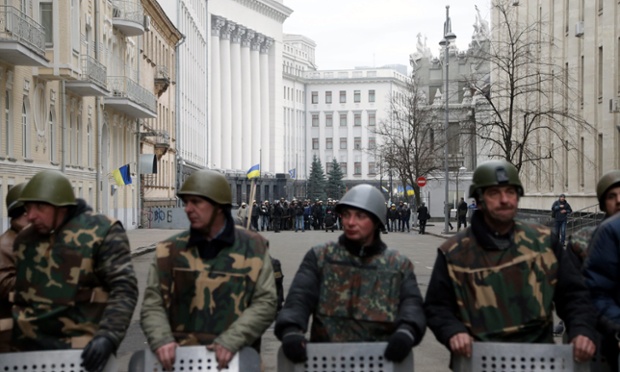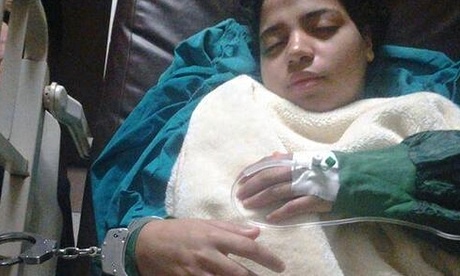I am not of those who turn a blind eye and keep their mouths shut in the face of corruption and wrongdoing. It has been decreed upon us, the Sadrs, to be those who call and work for guidance.
Here we are seeing our wounded and oppressed Iraq, under a black cloud that has covered its land and its sky: blood is flowing, wars are everywhere, people killing each other, some under the name of the ‘law’ and some under the name of ‘religion’.
Cursed is this ‘law’ that sheds blood and violates sanctities and down with a religion that gives right to beheading, bombing and assassinations.
Then politics became a door for injustice, mockery, autocracy and violation. So a dictator would become in charge of wealth, and he steals it, and of lives of people and he kills them, and of cities and he attacks them, and of sects and he divides them, and of minds and he buys them, and of hearts and he breaks them, so that everybody votes for him to stay in power.
Iraq with no life, no farming, no manufacturing, no services, no security or safety, no peace. And elections that thousands of lives are scarified for, all that, so a government would rule us, disregarding our rights and opinions, and a Parliament, with its worn seats, that can’t protect itself, let alone protect others.
A Parliament that can only agree to vote in one condition; if there are special rewards for MPs; but if there are (laws for) general benefit of the nation, everyone steps back, or the matter reaches the cabinet, where they (the laws) would be turned down/vetoed. But the cabinet would never veto against the MPs special rewards or their pensions.
Iraq that is ruled by wolves, thirsty for blood, souls that are eager for wealth, leaving their nation in suffering, in fear, in water puddles, in dark nights, lightened only by moonlight or a candle, swamped by assassinations based on differences or after ridiculous disagreements. All that and the government is only watching.
Iraq that is ruled by a group which came from beyond the borders. We long awaited for them to free us from the dictator, only for them to hold firmly on to the seats themselves, in the name of Shia, and Shiaism.
Was the Commander of the Faithful, Imam Ali (peace and blessings upon him) able to sleep whilst there was a hungry person near to him? And now, how full are the streets with (people) with no roofs, no walls, no basic food, instead they sleep on the bare ground, covered by the raining sky.
A government that is overstuffed, has forgotten those who live beyond the guarded walls, has become blinded with wealth, houses, palaces, and aeroplanes, ignoring a prison that is called ‘Iraq’.
An honourable nation, that has been engulfed by wars, with harsh conditions that left it an easy bite that has fallen between the jaws of politicians and leaders. A nation that does not want food, but it demands honour, a heard voice and freedom, that lead it to the pleasure of the Lord, and to prove itself.
But, a government has come to shut the voices, to kill the opposition, to force them into exile, to fill prisons with them, and with everyone who resisted and tried to free his country from the tanks and aeroplanes of the occupation.
A government that has dominated over everything. It does not listen to anyone, even to the voice of the ‘Marj’’ (scholar)i and his ‘fatwa’ (rulings), or even to the voices or complaints of its counterparts, supported by the East and the West, in a way that surprises every wise man. In all this, we do not want to take their post or their chair, as we, the Sadrs, are much above this. We want to guide them, and protect them from mistakes, so Iraq would be in safe and caring hands. But they only listen to their masters, leaving the Sadrs and the two Sadr martyrs behind them, and whoever has an objection against them; Shia, Sunni or Kurd, theywould accuse him of terrorism or sectarianism, using the politicised judiciary to finish him, or to the army to arrest him, or using media propaganda or other ways which you know more about.
We, the Sadrs, if we could not change this, we say: Oh God do not associate us with the oppressors, and associate us with those who love the truth.
Peace upon those who supported us, we have not betrayed them, and we will not betray them. We seek to protect them, and their reputation, and from being led astray in this life. Especially, as there are those who seek to manipulate you, our loved ones and even use our name, the Sadrs, to reach his heinous aims in this life .They have collected well, they have spilt blood, they have violated sanctities and became in charge of people’s lives using our name and no one else’s name
And all that, they do not respect a ‘fatwa’ (ruling) or ruling or a question or a decision (or even a small paper from me), not even advice and not even an order, they ignore all of these.
And so that you know, all the people of Iraq, we love you so continue on your faith, love, religion and your support. God has made you victorious by us and has made us victorious by you. You are an honour to us except those the misguided who misguide others, who chose this life over the afterlife- down with them.
If there are amongst you honourable voices, political or others, let them continue in their work but in an independent way or otherwise away from me, under general guidelines, based on righteousness, faith, patriotism, wisdom and the public good. Iraq should not be left to the people of injustice
But I shall remain for all, I am not only to the Sadrists, I have devoted myself to Iraq, to Islam and I shall remain for everyone.
Whatever decisions or orders I have made, that you could not bear, I seek forgiveness for myself and for you but I am proud of these decisions until the day of judgment because I tried in all of them to be inspired and based on the path of the two Martyrs, their ideas and their manners and I shall not deviate from this, as they are my masters and my leaders, they are my authority and their enemies are my enemies.
In addition the society appears to be far away from the remembrance of God all praise to him, and this this has put a distance between myself and the society to some extent. I urge the believers to remember God and to be obedient to him so that he may forgive us all and so the gates of mercy would open for us and may this be an opportunity for the appearance of truth. Truth shall rise and nothing shall rise above it.
O beloved ones I have a few other points to mention:
Firstly the participation in elections. Despite this decision (by myself), I see participation in the elections as an obligation and must be on a large scale so the government would not fall into the hands of the sly ones who cannot be trusted, God forbid.
As for me I shall vote and I shall give my vote, if I live, to every honourable person who wants to serve the people, and I shall stand with everyone at equal distance, so I ask the Iraqis to participate in these elections and not to fall short. To fall short in this would be a betrayal to Iraq and its people.
Secondly, there are politicians who have served the Iraqi people honestly and sincerely, “and if there were no pious ones, it would have been destroyed”, and they are many, God willing. But I particularly would like to thank and to mention the two brothers; the governor of Misan and the governor of Baghdad, may God reward them as He would reward the righteous ones. They should continue and perfect their work in serving their nation.
Thank You.
Translation of Sayd Muqtada Al-Sadr last speech on 18/2/14 by Hassen Basil Al-Sader.







